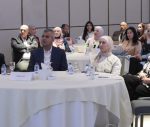You are here
Iran slams EU parliament for urging terror label on Guards
By AFP - Jan 19,2023 - Last updated at Jan 19,2023
TEHRAN — Iran condemned Thursday a European Parliament call to blacklist the Islamic Revolutionary Guard Corps as a terrorist group, which would pave the way for sanctions against the powerful military force.
Foreign Minister Hossein Amir-Abdollahian "strongly criticised the emotional approach of the European Parliament and labelled the move inappropriate and incorrect", in a phone call with EU foreign policy chief Josep Borrell.
Amir-Abdollahian called the resolution from Wednesday "harsh and unprofessional" and warned that EU must "think about the negative consequences of this emotional behaviour", his ministry said.
The General Staff of the Armed Forces, Iran's most senior military body which oversees both the Guards and regular army, warned the move "will affect regional and global security, tranquility and peace, and the European Parliament should be careful about its consequences".
The parliament had Wednesday urged "the EU and its member states to include the IRGC on the EU's terrorist list in the light of its terrorist activity, the repression of protesters and its supplying of drones to Russia".
The vote is non-binding but comes with EU foreign ministers already due to discuss tightening sanctions on Tehran at a meeting in Brussels next week.
The Guard oversee the volunteer Basij paramilitary force, which has been deployed against protests since mid-September triggered by the death of Mahsa Amini, 22, after her arrest for allegedly violating Iran’s dress code for women.
Authorities say hundreds of people, including members of the Iranian security forces, have been killed and thousands arrested during the more than four months of civil unrest.
Iran’s judiciary has confirmed 18 death sentences in connection with the “riots”, according to an AFP tally. Four of those convicted have been executed.
The Guard, formed shortly after the 1979 Islamic revolution, answer to Iran’s supreme leader Ayatollah Ali Khamenei and boast their own ground, naval and air forces.
The United States has already placed both the IRGC and its Quds Force, in charge of activities abroad, on its list of “foreign terrorist organisations”.
Then-US president Donald Trump ordered a January 2020 drone strike in Iraq that killed Quds Force commander Gen. Qasem Soleimani.
Iran’s top diplomat stressed in the phone call with Borrell that the IRGC is a “sovereign institution that plays an important and vital role in providing Iran’s national security and the security of the region”.
Kyiv and its Western allies accuse Iran of delivering combat drones to Russia specifically for use in the Ukraine war, an allegation Tehran denies.
Another major issue between Tehran and the West is the detention of a number of European nationals in recent years on charges including espionage.
Western powers argue they are held as bargaining chips.
Iran said Saturday it had executed British-Iranian dual national Alireza Akbari, a former defence ministry convicted of spying for the United Kingdom.
On Tuesday, Iran arrested a German national for allegedly photographing oil facilities in the country’s southwest, an Iranian newspaper reported.
Iran and Western powers have also been engaged in on-and-off talks since April 2021 to revive the landmark 2015 nuclear deal that gave Iran sanctions relief in exchange for curbs on its nuclear programme.
The deal has been hanging by a thread since 2018 when Trump unilaterally withdrew the United States and reimposed biting economic sanctions, prompting Iran to begin rolling back on its own commitments.
Related Articles
TEHRAN — The EU’s coordinator for talks to restore the 2015 nuclear deal met Iran’s foreign minister and its chief negotiator on Sunday in T
TEHRAN — Iran’s President Ebrahim Raisi on Wednesday presented his Cabinet to parliament, state media said, nominating a conservative as his
DAVOS, Switzerland — Tehran’s top diplomat said on Wednesday that his country’s armed forces targeted an “Iranian terrorist group” in Pakist

















